Kabul – A Blast in Baharistan
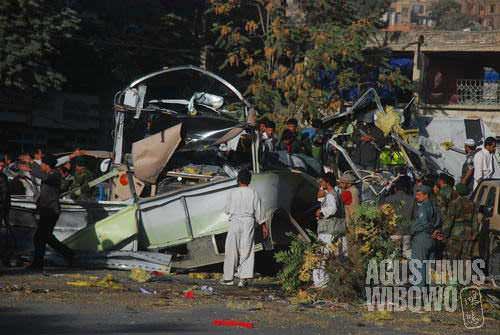
Bomb blast in the middle of holy month
An early morning in the middle of Ramadan, the Muslim’s holy month, Kabul once again saw one of deadliest terrorism attacks this year. A crowded bus loading soldiers of Afghan National Army (ANA) was ripped into two parts. All passengers on-board were feared dead. Civilians were among the victims. The holy month has not brought quiet peaceful moment in the country.
It is 6:45 a.m.
I was slapped from my lazy sleep by a big blast. After living in Kabul for a while, I am pretty much used to bomb blasts. “It must be another bomb blast,” I thought. But considering that the blast was very loud, it should be a big one. But what can I do? Nobody arrived in our news office and for sure it was not recommended for me to go alone.
I tried to go back to my sleep. I just wished it was not a bomb, but an accident from the near Chinese construction site.
But I could not sleep. Sirens of police cars or ambulance could be heard from my room. I know it was indeed a bomb blast, and for sure, a huge one.
7:00 a.m.
A photojournalist came to our office. He confirmed that it was a bomb. “It is in front of Baharistan Cinema,” he said, “it’s the way that we have to pass everyday and my brother’s car could not pass the road because it was blocked. Apparently if we were earlier by only 5 minutes, we might experience the bomb by ourselves!”
He asked me whether we should make coverage of the accident, as there were neither reporters nor office cars at this moment.
“Of course,” I said. Without even brushing my teeth and washing my face, I grabbed my camera and we left the office. On streets, I saw the green police cars shuttled around. It should be a busy day. Taxi was difficult to find on this street. My friend and I ran through a small alley of passport office, arrived to another street parallel to this one, and haggled down a taxi.
This is a shared taxi – a practical system of traveling in Afghanistan and Iran. The taxi driver was surprised hearing about the explosion. The other passengers of the taxi also condemned it. “This is Ramadan!” a passenger sighed.
We arrived to a junction. The road had been blocked already, so we had no choice but to walk. Local men were around. People were curious about the explosion. Police just tried hard to prevent casual watchers to get near.
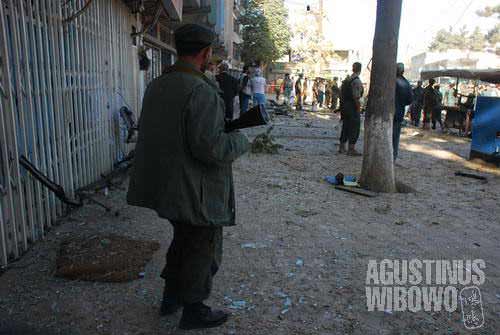
Destruction here and there
By flashing press card, we got the privilege to see the site closer. There were neither other reporters nor photographers yet seen on the scene. It seemed that the explosion time were too early for most news agencies’ office hour.
A bus was ripped by a large bomb, killing at least 27 and wounded 21 others
The bus was ripped into two parts. I saw roofless bus with its rows of chairs. No dead bodies were seen, but blood reddened the asphalt. Police and investigators were busy of picking up anything useful. This was already beyond the police line. Photographers were not supposed to be here. Seeing me with a camera, an angered investigator rushed me away, “There is no permission for journalists!”
The pedestrian pathway was scattered by pieces of glass. A restaurant and rows of pharmacists were severely damaged. The Baharistan Cinema, a place that should be quite familiar for me who passed the road on daily basis, turned to be a ghosted building that I even hardly recognize.
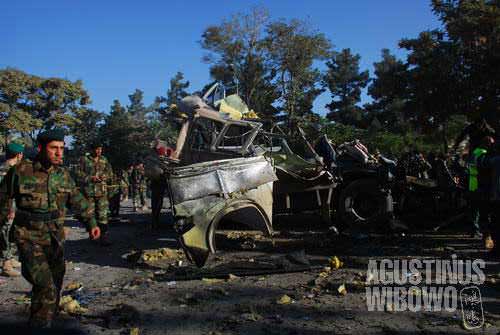
Cleaning up
A friendly local boy took me to a small alley and brought me to climb a mud house from a shortcut behind. Here I got a higher angle to the bomb blast site, but it was not that close. I decided to go down and try to get closer. Now the security was much tightened up. The Kabul police chief of crime investigator, Paktiawal, also arrived to the site with his dozen of bodyguards.
I met my photographer colleague again. Apparently as an Afghan it was easier for him to sneak around the area. But later the police officers also rushed him to go and we ended up to a park, might be called as Baharistan Park, where all other photographers, reporters, and cameramen gathered to make news from the now-the-closest-possible angle.
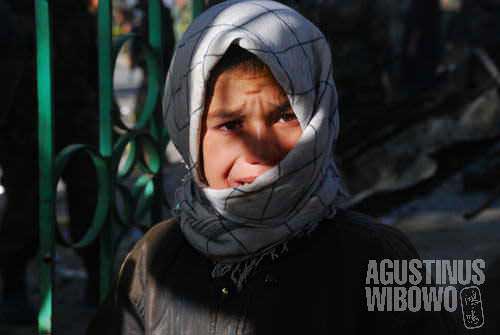
“My dad is here! My dad!”
A boy wrapped in shawl was crying hysterically. “My father was crossing the street, to that cinema, and now he disappeared,” the saddened little boy explained with his tears. The police who tried hard to sterilize the explosion site persuaded the boy to go home, “Who knows your father now is waiting for you at home.” The boy was persistent. “No, he was here.” He kept crying.
Another eye witness reported that it was indeed a big blast. His white shirt was reddened by blood. “It was like an atom bomb!” Fire, dust, smoke, and dead bodies were everywhere – except dust, neither of which was visible at this moment.
It was revealed that the bus was actually stopped in front of the Baharistan Cinema to pick up soldiers to work place. A stranger dressed in military uniform attempted to board the military bus, and then he blasted himself. The blast claimed all the unlucky souls on board, and killed some other civilians nearby.
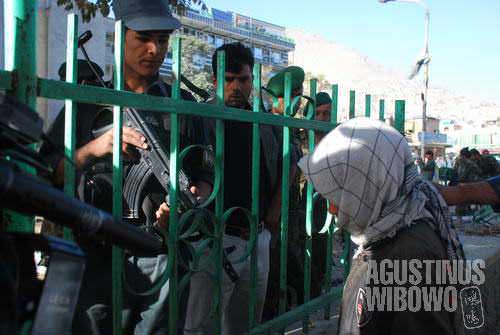
Nobody can get close by, including boy claiming as son of a victim
The fatality of the blast could be testified by the scattering body parts around the site. The trained investigators even had to climb the trees to collect flown body parts of the victims.
A staff of Indonesian embassy lived just across the Baharistan Park. When I was photographing, his brother-in-law called me to visit the big house. “It was scary. I thought it was an earthquake,” said the man from Sumatra, an area in Indonesia which recently is jolted by quake frequently. “It is not earthquake, of course, but the house was vibrating and glass of the windows is broken.” Broken pieces of glass were still around. This man with his wife and little children just came from Indonesia not more than four months ago, and already witnessed Afghan deadly terrorist attacks not more than 100 m away from their doorstep.
Later on the day, Taliban claimed responsibility on the blast. They said that it was one of their trained jihadis named Azizullah who did the mission successfully. At the start of the Muslim holy month of Ramadan, Taliban already called for increased attacks on international forces, which would include suicide bombings, ambushes, and other attacks. Typically, the Taliban attacks only aim to foreign forces, government ministries, police, and military, but civilians are often victimized as well. This year is the worst as Taliban had recorded more than 100 attacks up till the third quarter of this year.



Leave a comment